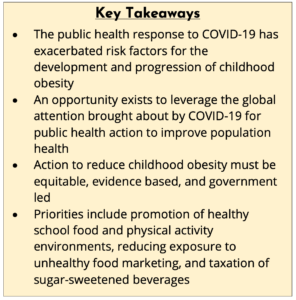A new study shows that the COVID-19 pandemic has worsened the risk factors for the development and progression of childhood obesity.
An international team of researchers has found that the public health response to the COVID-19 pandemic has worsened the risk factors for the development and progression of childhood obesity. As societies build back from the pandemic, they recommend a focus on reducing childhood obesity risk factors through equitable, evidence-based, and government led action.
Priorities for action in reducing this risk and improving population health and health equity include promoting healthy school food and physical activity environments, reducing children’s exposure to unhealthy food marketing, and imposing taxes on sugar-sweetened bever ages. These actions are proven to be successful, cost-effective, can improve health equity, and comprise a comprehensive approach to preventing childhood obesity.
ages. These actions are proven to be successful, cost-effective, can improve health equity, and comprise a comprehensive approach to preventing childhood obesity.
During the pandemic, schools were closed for long periods of time and as a result, many children learned from home, which reduced opportunities for physical activity. School closures also reduced the availability of nutritious foods for children who rely on school meals.
The COVID-19 pandemic has also increased reliance on digital platforms for children’s learning and communication and in turn increased exposure to unhealthy food and beverage marketing, which can impair their dietary choices and consumption. The study team found that there is a need to restrict and regulate marketing of unhealthy food and beverages.
Many households were increasingly reliant on low-cost foods that are calorie dense and processed, due to the economic effects of the pandemic. The study team found that a tax on sugar-sweetened beverages is an effective public health intervention that can reduce consumption of sugar-sweetened beverages and can reduce obesity.
The researchers conclude that governments must focus on childhood obesity risk factors that were increased by the COVID-19 pandemic and take public health action to promote population health and health equity.
Citation:
Chung A, Tully L, Czernin S, Thompson R, Mansoor A, Gortmaker S. Reducing risk of childhood obesity in the wake of covid-19. The BMJ. 2021;374:n1716. doi:10.1136/bmj.n1716